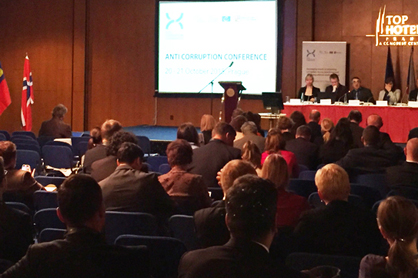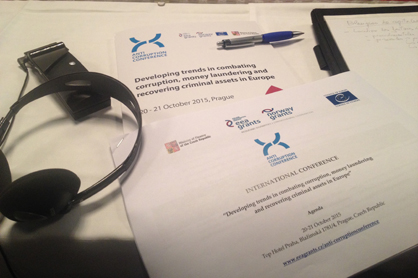United against corruption
 Leading representatives from the legal, political and civil society sphere all over Europe gathered on 20 and 21 October in Prague to discuss issues such as the fight against corruption, money laundering and asset recovery, in an international conference funded by the EEA Grants and organized by Czech Republic Focal Point and the Council of Europe.
Leading representatives from the legal, political and civil society sphere all over Europe gathered on 20 and 21 October in Prague to discuss issues such as the fight against corruption, money laundering and asset recovery, in an international conference funded by the EEA Grants and organized by Czech Republic Focal Point and the Council of Europe.
28.10.2015
Some 250 participants from 47 countries gathered in Prague in one of the most important conferences organized within the EEA Grants framework. Practitioners, policymakers and experts discussed for two days about how to ensure transparency of political funding and lobbying; how to prevent and combat judicial corruption; whistle-blower protection and anti-money laundering and criminal assets recovery. The goal was to exchange best practices and promote coordination in order to respect international standards in this field, such as the Group of States against Corruption (GRECO) recommendations.
The two-day programme included speakers from the Council of Europe and donor countries, but also from various European countries, including from the governments, parliaments, ministries, courts, national bank, research institutions, civil society, media and from Transparency International.
In the transparency and political funding chapter, experts stressed that this issue continues to be a major challenge for the majority of European countries, due to poor regulation, and it is related with a bigger problem: lack of confidence in the political class due to a vast array of corruption scandals. A common risk identified is loans from financial institutions, neither regulated not transparent. Unfortunately, Spain was mentioned related to the slowness of the control exercised by the Court of Auditors, which makes public its reports after a three years period. Some solutions could be to disclose the political parties’ donors list to the public or setting up a ‘corruption hunters’ network composed of prosecutors, researchers and international organizations.
Lobbying is acquiring greater relevance in Europe. The objective must be to develop a specific law tailored to the specificities of each country with common points such as the establishment of a lobbies register, making public all their contacts and, also, the agenda of policy makers. Some members of the EU have developed legislation recently in this field (2000-2015). The model should be United States, with more than 50 years of experience.
 The effective prevention of corruption among judges and prosecutors requires, according to the attendants to the conference, measures in regulating the conditions of service, ethical standards, conflict of interests and asset declaration regimes. The problem of political influence over judges and prosecutors was also raised. A praiseworthy initiative is the creation of a code of ethics and an ethics committee in Czech Republic to which the citizens and media can raise consultations about judges and prosecutors actions.
The effective prevention of corruption among judges and prosecutors requires, according to the attendants to the conference, measures in regulating the conditions of service, ethical standards, conflict of interests and asset declaration regimes. The problem of political influence over judges and prosecutors was also raised. A praiseworthy initiative is the creation of a code of ethics and an ethics committee in Czech Republic to which the citizens and media can raise consultations about judges and prosecutors actions.
The whistle-blower protection roundtable revealed the need for effective laws, something that many countries do not have, following OECD and Council of Europe guidelines.
Anti-money laundering is widely supported by international standards, but its implementation is not always easy. EU 4ª Directive implementation was discussed, which includes new requirements that have posed a number of significant challenges for the states, such as the national risk assessment or the transparency of legal persons through the creation of centralized national registers of beneficial ownership.
Finally, in the area of criminal asset recovery, despite the advances, there are still problems, such as the need to create interdisciplinary teams and agencies focused on an effective management of the assets.
Recommendations:
- 1.International cooperation (Warsaw Convention): The Council of Europe, the Spanish Anticorruption prosecutor’s office and the National Court agree on the real benefits of an effective international cooperation against money laundering. This cooperation may take the most effective form: legal, political or between central tax authorities. National resources commitment is necessary.
- 2. A judicial definition of criminal acts and penalties at international level is required, in order to avoid “crime tourism”.
- 3. Improved control over political corruption risk: disclosing political groups’ donors list, controlling financial loans to political parties, gifts vs. bribes, conflict of interests, “cooling-off” period and handling of inside information. Civil society and media play a crucial role in such control, while the Spanish Court of Auditors didn’t have the necessary resources.
- 4. Lobbies: Openness and transparency of the lobbies activities, as well as making public the agenda of policy makers. Legislative footprint (changes in the regulation, why and who).
- 5. Whistle-blower protection: development of international standards which ensure their protection and social reputation for their contribution to transparency.
- 6. Confiscation of assets: exploring non-convicted confiscation, extensive confiscation (when an individual’s property and assets were disproportionate with respect to their economic capacity). It is imperative setting up an international network of Asset Recovery Bureaus.
- 7. Money laundering: a strong political commitment at the highest level is necessary in order to ensure cooperation between national entities, pay special attention to politically-exposed persons (PEP) and “trusts” that mask the real persons involved.
- 8. Guarantor of the independence of the judiciary through the incorporation of the recommendations of GRECO about Spain, transferring the election of the majority of judiciary positions to the judges themselves.
The International Conference “Developing trends in combating corruption, money laundering and recovering criminal assets in Europe”, was organized by the Czech Republic Focal Point and the Council of Europe and funded by the EEA and Norway Grants. The Spanish National Focal Point and representatives from Spanish legal and security bodies took part in it.